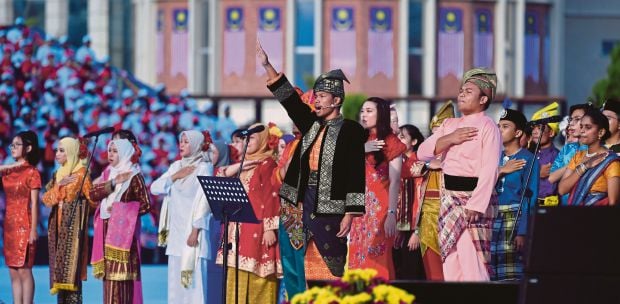LETTER: The Malaysian Alliance of Civil Society Organisations in the UPR Process (MACSA) views the Mid-Term Report prepared by the Human Rights Commission of Malaysia (Suhakam) on Malaysia's Third Universal Periodic Review with great concern.
MACSA is alarmed at the haste and insistence of Suhakam in promoting the 'recognition of a third gender'. Usage of the term 'non-binary' (someone who says they are neither male nor female) in their report, as well as other gender identities and sexual orientations, clearly show Suhakam's intention to continue promoting this misguided ideology.
In June of this year, Suhakam publicly offered a research grant entitled "Feasibility of Having Legislation of the Recognition of a Third Gender in Malaysia". As the name suggests, it is with the aim of exploring legislation to recognise a 'third gender'.
In the terms of reference, Suhakam stated that regardless of the study findings, the researchers must be in support of the predetermined objective outlined by Suhakam, which is "to develop comprehensive legislative reforms to set out guidelines for gender recognition for transgender people in Malaysia".
Research with a predetermined conclusion is not research. It is an attempt to force upon the public erroneous beliefs which cannot otherwise be stomached.
Fortunately, the grant proposal was heavily criticised by academics and various civil societies. Over 150 civil societies joined hands to strongly oppose it, and a petition against the proposal launched by MACSA garnered thirty thousand signatures within two days.
Religious institutions including Jakim, and the Offices of the Muftis of Selangor, Perak, Perlis and the Federal Territories all went on record to object to the proposal as it was a clear anathema to family values and Shariah law. Recognition of a 'third gender' would clearly have significant negative implications to the family institution.
Suhakam's study proposal however received a nod from the Associate Director of Lesbian, Gay, Bisexual, and Transgender Rights Program of Human Rights Watch, claiming that international human rights standards provide clear guidance on addressing this problem through legal gender recognition, a claim which is highly debated as many countries do not recognise a 'third gender' for several reasons.
Even for countries which have such recognition, the problem of 'discrimination' has still not been effectively dealt with by this non-biological classification.
In doing so, Suhakam have exposed their own lack of independence and blind deference to whatever external pressures that are being wielded upon them to promote this immoral agenda.
It begs the question, who are Suhakam accountable to? Are there darker forces at work who have usurped a government body that is entrusted to carry out more relevant work for the people of this country?
It is perhaps due to this external pressure that within the span of four months, Suhakam refused to listen to the masses and religious authorities, and proceeded with the intention to recognise a 'third gender' through its recently released Mid-Term Report for Malaysia Third Universal Periodic Review.
Suhakam's recommendation in the report which stated that "…to the Government to have an inclusive approach to the right to health that includes accessible and affordable healthcare to all persons in Malaysia including vulnerable and diverse communities i.e. male, female, non-binary, LGBTQ+ persons and migrant workers," is clearly an offence to the moral fabric of our Malaysian society.
Such graphic descriptions are wholly unnecessary as basic rights and protections are already bestowed upon all citizens of Malaysia. The sly wording of this report cogently aims to let this ideology get its foot in the legislative door to further promote their corruption, and will inevitably create disharmony within our society.
There has yet to be a reported case where an individual in Malaysia publicly admits he or she is a non-binary, yet Suhakam (a government-funded body) has completely over-represented this misguided idea through their official Mid-Term report.
Even in the disciplines of biological sciences and medical physiology, there is no place for this 'non-binary' idea due to the fact that these individuals will be subjected to either the male or female gender. In particular, for chromosomal problems such as intersex and sexual development disorders, there is gender specialisation to its management approach.
MACSA is called to remind Suhakam of Section 2 of the Human Rights Commission of Malaysia Act 1999 that defines 'human rights' as referring to fundamental liberties as enshrined in Part II of the Federal Constitution.
In addition to this, Section 4(4) states that compliance with the Universal Declaration of Human Rights 1948 (UDHR) is limited to the extent that it does not conflict with the Federal Constitution. This means that any rights and freedoms that are not mentioned in Part II of the Federal Constitution but are in the UDHR must only be referred to subject to the condition that they do not conflict with the Federal Constitution.
MACSA stresses the fact that many laws in Malaysia only recognise and mention male and female sexes, although there have been attempts to replace them with the word gender so as to allow recognition of a 'third gender'.
Such a disruptive proposal will affect not merely the medical rights of Malaysian citizens but also our legal rights. It is an ironic proposal considering that Section 5(3) of the Suhakam Act states that Commissioners must be selected from male and female from various fields of expertise. Suhakam's antics are not even consistent with the Act that enables its own existence.
It is clear that the Commissioners in Suhakam have failed to ensure that any values in conflict with the religion of the Federation and the cultures of Malaysia are not introduced into reports published by the Commission.
Suhakam chooses instead to subjugate itself to imported ideologies from the West, instead of listening to Malaysians of all faiths and adhering to our fundamental beliefs. We call for the commissioners of Suhakam to have some gumption and stand their ground in this matter, or if they are unable to do so for whatever reason, to do the honourable thing and relinquish their positions which have been entrusted upon them.
ASSOC PROF DR RAFIDAH HANIM MOKHTAR
Co-chairperson of Malaysian Alliance of Civil Society Organisations in the UPR Process (MACSA) and president of the Women's Alliance for Family Institution and Quality Education (WAFIQ)
The views expressed in this article are the author's own and do not necessarily reflect those of the New Straits Times





